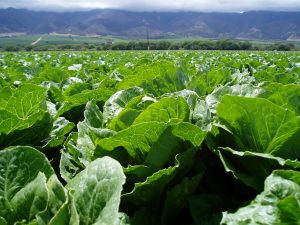Project Title: “Evaluation and demonstration of nitrogen management of organic vegetable production in leafy green vegetables on the Central Coast”
Project Leaders: Richard Smith, Michael Cahn, and Tim Hartz
Location: California Central Coast
 Overview: This project aims to evaluate the proportion of crop nitrogen (N) that is provided by soil organic matter mineralization in organic leafy vegetable production under coastal climate conditions. This research also seeks to better understand the potential loading of N and phosphorus (P) in organic systems.
Overview: This project aims to evaluate the proportion of crop nitrogen (N) that is provided by soil organic matter mineralization in organic leafy vegetable production under coastal climate conditions. This research also seeks to better understand the potential loading of N and phosphorus (P) in organic systems.
Issue: Substantial research about the expected N mineralization of common organic fertilizers and amendments is available, but there are significant differences among research sources, which can contribute to grower uncertainty. Coupling this uncertainty with the difficulty of managing irrigation of shallow-rooted crops, and a rotational system in which multiple crops are grown annually, it is easy to see how diverse and potentially inefficient N fertility practices could arise. Given the high value of organic leafy vegetables, there is resistance to taking risks with reducing nitrogen applications to these crops. Organic vegetable production in the Central Coast is expanding, which intensifies the economic and environmental impacts of current fertility practices.
Impact: This study provides a practical and easy-to-use method of estimating N mineralization from organic matter. This information will assist organic and conventional vegetable growers, who apply organic fertilizers, with fertilization scheduling, which will help to reduce N and P application rates without affecting yield.
Approach: The project leaders conducted trials on commercial organic fields in the Salinas Valley using two pelleted fertilizers (manure vs. non-manure based), to compare the effects of application method (surface application vs. shallow incorporation) on N mineralization. The fields included a cross section of organic producers, soil types and locations in the Salinas Valley. For this project, they determined the balance of inputs of N and P into the production fields and the removal of N and P in the harvested product. N and P inputs included fertilizer, mineral N in irrigation water, composts and crop residues.
Preliminary Results: The data from these trials indicated that the lag time in N mineralization from organic fertilizers is substantial. N mineralized from applied fertilizer ranged from 36-54% N released in the first crop cycle. Yield was much more closely correlated to the amount of residual soil N. Additionally, the researchers found that the organic field sites had P levels that were as high as conventionally managed fields, but values were not elevated beyond conventional fields despite higher annual applications of P.
These studies underscore the complexity of fertilization for fast maturing, high N demanding, leafy green vegetables in an organic system. Over the two years of evaluations, researchers observed that significant amounts of fertilizer N remain in the fields, which contributes to a buildup of total N in the soil system, but the fate of this N is not well understood. Estimates of N mineralization from soil organic matter and initial soil nitrate levels are an essential tool in helping guide fertilization of organic leafy green vegetables.
What’s next: The last year of this project will focus on integrating the mineralization data developed by this research with the algorithms currently used in CropManage. This integration of data will make the N management aspect of CropManage more applicable and useable for organic vegetable producers.
Additionally, results from this project have been presented at seven events across the Central Coast over the past two years. There will be additional events in 2018 and a demonstration field day for this project will be held at the USDA Spence Research Station. Check the FREP Calendar to get updates on all upcoming field days and outreach events related to FREP’s research and priorities.


